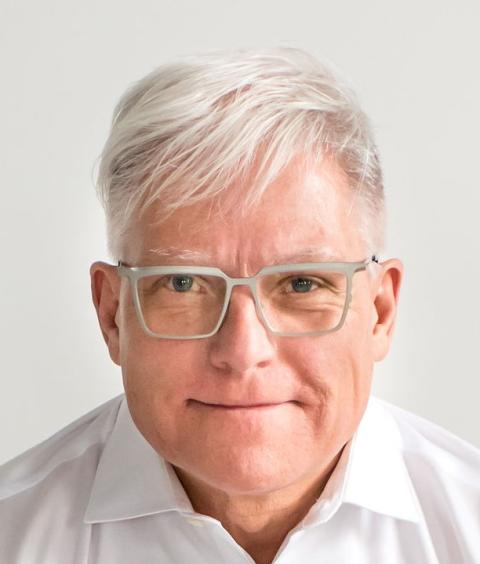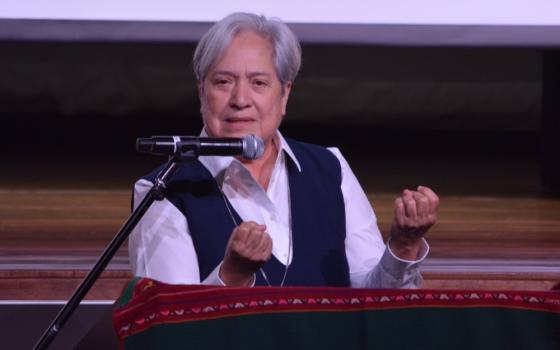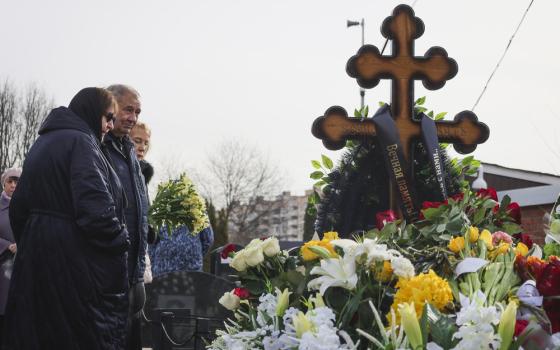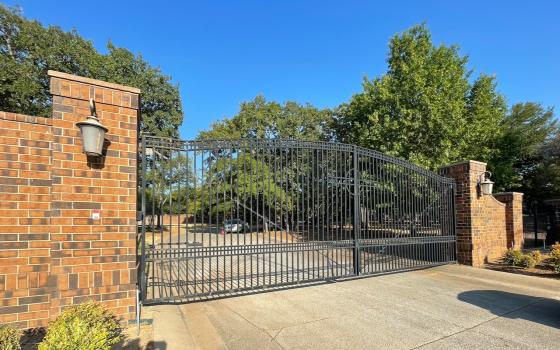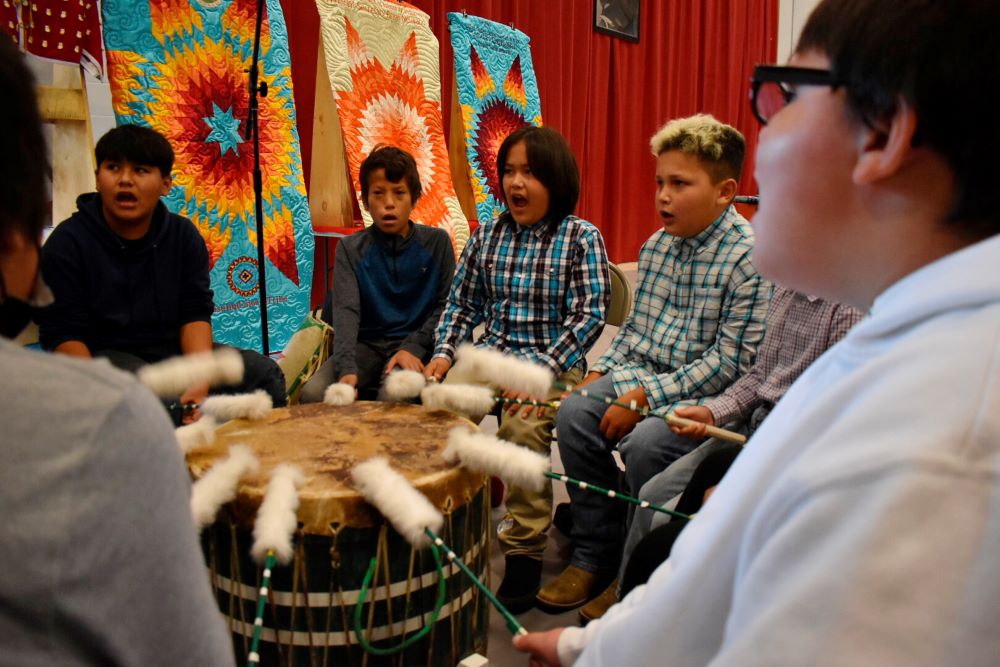
Students from Rosebud Elementary School perform in a drum circle during a meeting about abusive conditions at Native American boarding schools at Sinte Gleska University on the Rosebud Sioux Reservation in Mission, S.D., Oct. 15, 2022. (AP/Matthew Brown)
Among a spate of important decisions expected from the U.S. Supreme Court this year is one that could overturn or fundamentally change the Indian Child Welfare Act, a 1978 federal law meant to keep American Indian children who are citizens of federally recognized tribes with their communities in custody, foster care and adoption cases.
The ruling in Haaland v. Brackeen, expected this summer, has sparked a fierce debate. Defenders of the Indian Child Welfare Act, or ICWA, see it as necessary to interrupt a long history of the U.S. separating Indigenous children from their families, while its detractors call the measure a form of racial discrimination.
Also involved in the case's complex dynamics is U.S. Catholic history. In the late 19th and 20th centuries, American Catholics operated boarding schools that separated Indigenous children from their families in an effort to force their assimilation.
"All of this is relevant to the Catholic faith in particular because of the Catholic Church's history," said Maka Black Elk, a Catholic and executive director for truth and healing at Red Cloud Indian School, a former boarding school run by Jesuits, in an interview with NCR.
Maka Black Elk, a leader in Native American and Catholic education for truth, healing and reconciliation, is seen in front of the Red Cloud Indian School in Pine Ridge, S.D., May 5, 2021. (CNS/Marcus Fast Wolf, courtesy Red Cloud Indian School)
At the heart of the Haaland v. Brackeen case are suits brought by the states of Texas, Louisiana and Indiana claiming that ICWA unconstitutionally infringes on state autonomy and allows for race-based discrimination in adoption cases.
Advocates for the act, including tribes, 28 child welfare organizations, the American Academy of Pediatrics and the American Medical Association, call the law the "gold standard" of child welfare because of who it prioritizes placing children with for foster care and adoption.
According to the law, if a child is a tribal citizen or they have a tribal citizen parent and are eligible for tribal citizenship, preference in foster care and adoption must first be given to their extended family, then their tribe, then another American Indian tribe.
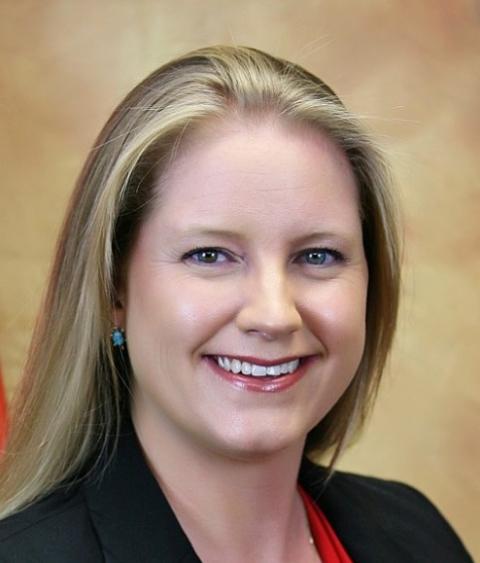
Chrissi Ross Nimmo, a Cherokee citizen, is deputy attorney general for the Cherokee Nation. (Courtesy of Chrissi Ross Nimmo)
Chrissi Ross Nimmo, deputy attorney general for the Cherokee Nation and a Cherokee citizen, told NCR that the act is not based on race. "If you have a child who has Native blood and neither they or their parents are enrolled in a tribe, ICWA doesn't apply," she said.
Mark Fiddler, a member of the Turtle Mountain Band of Chippewa Indians who is a family law attorney for non-Indigenous foster parents challenging ICWA, said that his views on the act had changed over the course of his career.
"When I was an advocate for ICWA, it was based on my understanding that ICWA allowed for flexibility, and that it could accommodate the best interest of the child in each particular case," Fiddler said.
"I firmly believe that, at the time, that there was flexibility written into ICWA, but by judicial decision and other state law extensions of it, that that flexibility is gone," Fiddler explained.
Fiddler said that learning about attachment theory had convinced him that children should not be removed from homes where there's a secure attachment, even to move an Indian child to a tribal member's home.
Fiddler described cases where an American Indian child was in foster care for a few years with non-Indian parents who were then unable to adopt the child because of ICWA. "Why would we deliberately disrupt and break that attachment because we found another Indian adoptive parent two years later?" he asked.
Nimmo, who supports the act, said that Fiddler was describing cases where ICWA was improperly followed. "When you do have cases, ICWA cases, that are prolonged, it's often because the law wasn't followed from the beginning," she said.
"There's really no teeth in ICWA for noncompliance, but for the case starting over," Nimmo explained. She said she thinks ICWA compliance would increase if it were tied to federal funding for foster care.
A number of Indigenous adults who were adopted by non-Indigenous parents have spoken publicly in favor of the act.
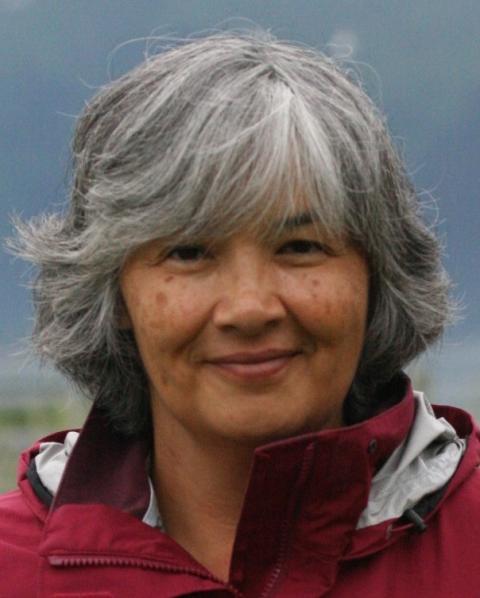
Susan Devan Harness, a member of the Confederated Salish and Kootenai Tribes, is among Indigenous adults who were adopted by non-Indigenous parents have spoken publicly in favor of the act. (Courtesy of Susan Devan Harness)
Susan Devan Harness, a member of the Confederated Salish and Kootenai Tribes who was removed from her birth family at 18 months old and then adopted by Euro-American parents, told NCR, "To get rid of ICWA is to place Indian children at risk for just isolation and racism."
"Everything within our culture points to the fact that you are not as good as, as a Native child," Harness said. Even though a child might not receive these messages from their adoptive parents, these ideas are present in portrayals of history, sexualized images of Native American women and mascots, she said.
If the argument that ICWA is racially discriminatory is successful, Nimmo said, "it could be used to apply to other areas that could be absolutely detrimental to tribes across the country."
Gibson Dunn & Crutcher, the law firm that is working with Fiddler on the ICWA challenge in Haaland v. Brackeen, is also challenging the Indian Gaming Regulatory Act using a similar argument about racial discrimination. Gaming is a major source of revenue for many tribal governments, who use that income to provide social services.
"Every child that is removed from the reservation, that is a child that could have passed on a language, that is a child that could have passed along traditions."
— Susan Devan Harness
"It is not an exaggeration to say all federal Indian laws would be at least subject to challenge on the same argument" if ICWA's challengers are successful, said Nimmo, pointing to other elements of Indian law, including tribes' rights to control resources on their land, the Indian Health Service, and tribal citizens' right to possess eagle feathers.
"This becomes an existential crisis each time this happens," said Black Elk, referring to previous challenges to ICWA. "It strikes fear in the hearts of many Native people who wonder if this is the beginning of the end."
Congress passed ICWA in 1978 after reckoning with the high numbers of Indigenous children who had been removed from their families and placed with non-Indigenous families. A 1976 report by the Association on American Indian Affairs had found that from 1941 to 1967, between 25% and 35% of American Indian children had been separated from their families. Of those separated, 85% were placed in non-Indian homes or institutions.
The Indian Adoption Project ended in 1967. The federal program had started in 1958 to experiment with the adoption of Indigenous children by non-Indigenous families as a cheaper form of assimilation compared to foster care or boarding schools.
Throughout the 1960s, the Catholic Charities Review, which was run by the predecessor of Catholic Charities USA, published articles by the director of the Indian Adoption Project, Arnold Lyslo, promoting the adoption of Indigenous children and portraying Indigenous parents as unfit.
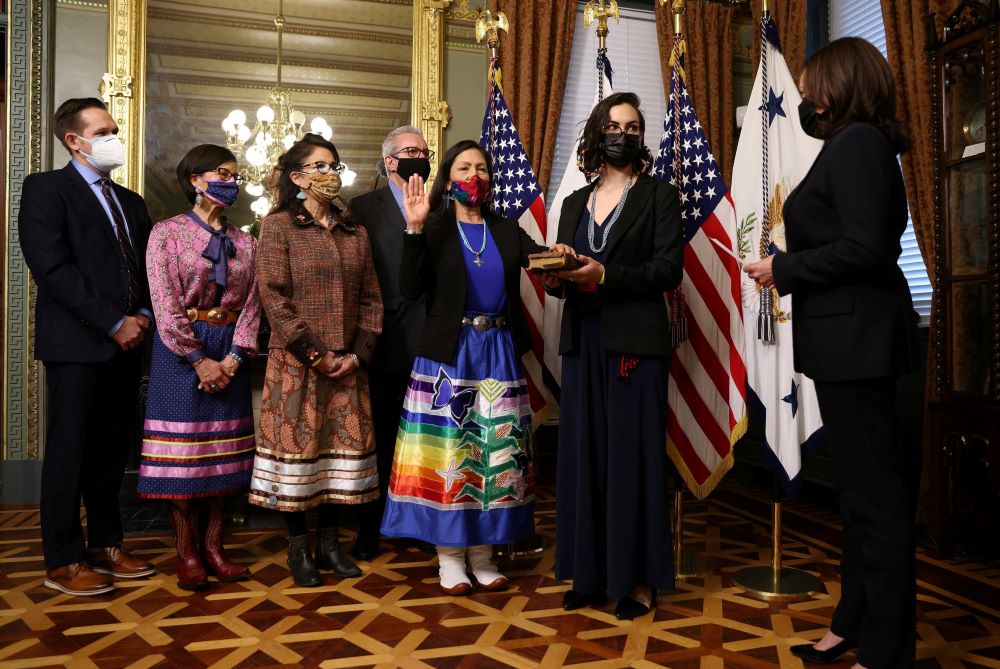
Debra Haaland, an enrolled citizen of the Laguna Pueblo tribe (center), is sworn in as U.S. secretary of the Interior Department by Vice President Kamala Harris March 18, 2021. Haaland, the first Native American to serve as a Cabinet secretary, is a defendant in Haaland v. Brackeen. (CNS/Reuters/Tom Brenner)
Margaret D. Jacobs, a professor of history at the University of Nebraska-Lincoln, writes in her 2014 book, A Generation Removed: The Fostering and Adoption of Indigenous Children in the Postwar World, that Lyslo had claimed that Indigenous children experienced racial inequality because they lacked opportunities to be adopted.
A Generation Removed also revealed that Lyslo coordinated with Catholic social service organizations in many states. Additionally, Catholic Charities in Ohio frequently placed Indigenous children from Canada in American homes.
The Indian Adoption Project began as Indian boarding schools in the U.S. were dwindling.
A 2022 report from the U.S. Department of the Interior said students in these schools experienced "rampant physical, sexual, and emotional abuse," disease, malnourishment, overcrowding and lack of access to health care.
Pope Francis leads a meeting with young people and elders in Iqaluit in the Canadian territory of Nunavut July 29, 2022. During his visit to Canada, Francis apologized for the Catholic Church's "catastrophic" involvement in the "cultural destruction" of Canada's Indigenous peoples through its participation in running the country's residential schools. (CNS/Vatican Media)
Catholics operated 80 of the 367 American Indian Boarding Schools identified in 2020 by The National Native American Boarding School Healing Coalition.
In July 2022, Pope Francis traveled to Canada to apologize for Catholic involvement in "cultural destruction" in similar schools there.
"Annihilation has been behind these policies since day one," said Harness, who is a cultural anthropologist. "Every child that is removed from the reservation, that is a child that could have passed on a language, that is a child that could have passed along traditions," she said.
Fiddler, however, is skeptical of narratives that link history with current adoptions.
"Not every instance of out-of-home placement of an Indian child in a non-Indian home is an example of cultural genocide," Fiddler said. "The intention and the purpose of removal is incredibly important."
Advertisement
When ICWA was last challenged, in a 2013 Supreme Court case, the National Advocacy Center of the Sisters of the Good Shepherd and the Conference of Major Superiors of Men joined a Quaker advocacy group's amici curiae brief in favor of the act, acknowledging that religious organizations "had been complicit in the cause of the problem" of Indigenous family separation.
In the current Haaland v. Brackeen case, the only amici curiae brief submitted by a religious organization comes from the Christian Alliance for Indian Child Welfare, which is opposing ICWA along with several families, including both tribal citizens and non-Native birth parents, who say they were harmed by ICWA.
Haaland v. Brackeen, which was argued in November, will be decided by a Supreme Court in which three of the nine justices are Catholic adoptive parents.
'The spirit of ICWA is about maintaining family, and that should be core to our Catholic faith in terms of just really upholding the dignity of families.'
—Maka Black Elk
Black Elk said the U.S. bishops should advocate for ICWA to atone for the church's history and in recognition of its impact on human dignity.
"This issue of Native people's very existence as a political body that is able to self-govern, that's an issue of dignity," said Black Elk, a citizen of the Oglala Lakota Nation. "The spirit of ICWA is about maintaining family, and that should be core to our Catholic faith in terms of just really upholding the dignity of families."
Black Elk said that Catholics have a particular responsibility to learn about the church's historic impact on Native people, calling the work of truth and reconciliation "sacramental."
"We are a church harmed by secrecy. We are a church harmed by avoidance. We need to be a confrontational church. We need to be a courageous church, and that means engaging in really difficult things," said Black Elk.

